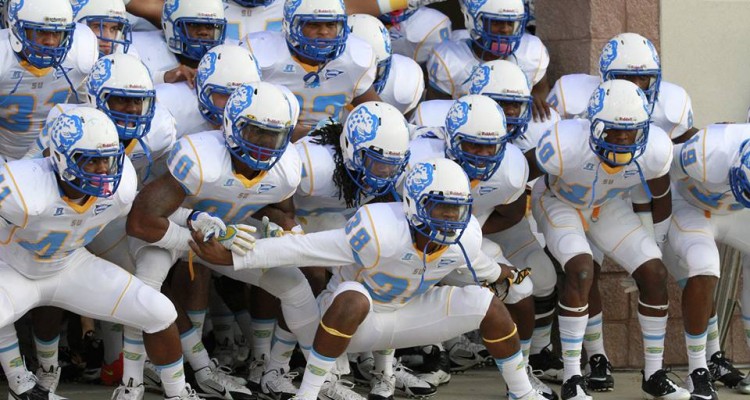
When the Division I membership created the Academic Performance Program, leaders emphasized the goal of the new academic standards and accompanying penalties for missing the mark was to inspire schools to improve, not punish them.
By that standard, the biggest Academic Performance Program success stories are happening at historically black colleges and universities and limited-resource schools. As a group, HBCUs have improved more than 40 Academic Progress Rate points in the past six years. Limited-resource schools, defined as ranking in the bottom 15 percent of Division I schools in several financial categories, have increased their collective Academic Progress Rate by nearly 30 points.
The number of penalized schools and teams from HBCUs and limited-resource schools continues to drop, reaching its lowest levels ever this year. The NCAA today released the full Academic Progress Rate data, including trends and penalties.
One of the clearest turnaround stories happened at Southern University. Just three years ago, the school was sitting in unusable data status. Eligibility and retention of student-athletes at the school couldn’t be verified, so none of their points could be counted. That rendered every team at the Louisiana school ineligible for NCAA championships.
In a year when the men’s basketball team was leading the Southwestern Athletic Conference and confident about winning the automatic bid to the Division I Men’s Basketball Championship, the news was heartbreaking. Some of the tough conversations fell to Trayvean Scott, the newly hired associate athletics director for compliance.
“I had to have some honest conversations with leadership. Sitting across from a coach and talking about what’s going on with the whole athletics department and how to fix his individual program … it’s difficult,” Scott said. “These coaches and student-athletes work so hard every day, and something that was out of their hands was the reason why they can’t play in a tournament.”
The men’s basketball coach at that time was Roman Banks, now the athletics director. Banks first took the role in 2015 on an interim basis to help the school make sure it found the right person to lead the department. Turns out, the right person was Banks.
“I’m driven to make Southern the best it can be from a holistic side, not just through basketball. From where we came from, if we stay on this path, we’re on the right one,” Banks said. “Coaches are always driven by challenges, and this has been a great challenge.”
That viewpoint was a valuable one because both Scott and Banks say the data review process uncovered problems at the school that weren’t limited to athletics. Eventually, the data review led to an enforcement investigation and findings of violations by the Division I Committee on Infractions.
But each department that touches the athletics department — the registrar’s office, financial aid office, admissions, academic advising —has been involved in the turnaround.
Banks said the process began with a commitment from university leadership that the school would remain Division I. Without that buy-in, success would have been impossible. Their commitment — and the resources that accompanied it — led to the construction of a new academic center for athletes that will open in September.
Next, Banks and Scott built processes that will live long after they leave the school. One of the biggest problems Southern University and many other lower-resource schools face is high rates of turnover among staff. Southern University didn’t have written processes for interacting with the rest of the university, which impacted Academic Progress Rate data collection and eligibility certification. Now those processes are written and will be available to anyone who steps into a new position at the school.
As it has for the past three years, the school plans to bring 25 people from all over campus to the upcoming NCAA Regional Rules Seminars. Educating all of campus on NCAA rules became a priority.
The student-athletes also have been an integral part of the process. Some students who were given the opportunity to transfer during the unusable data period took the chance. Others remained.
“They pulled their pants on, put their shirt on and came back to work to help lead us out of this process. They still won basketball games and football games and track meets,” Banks said. “They gave me a lot of motivation. They’ve been so resilient. … We can’t fail the student-athletes anymore. We must do everything in our power to give them a chance to come to Southern to get an education and be the best they can be in their sport. That’s our mission.”
The resolve — from the top to the bottom — led to improved Academic Progress Rate scores. Most teams languished in the 400s and 500s in 2012-13. This year’s scores fall in the 750s to 970s. Three years ago, every team was subject to penalties. This year, only four teams will have penalties, a success based at least partly on the enormous improvement.
“(Banks) was the right leader at the right time,” Scott said. “We’ve made advancements in academics and rules education. We’re trying to be the model of how to get out of infractions. You don’t just fold the tent and run. You are accountable, regardless of whether you were there when they happened or not.”
Banks was named the permanent athletics director at Southern University about six weeks ago. The school has hired a new president and several high-level academic leaders in the past three years. Banks said everyone is on board and ready to walk into the future with Southern University students as their top priority.
“This university has been around more than 100 years. More than anything, we have learned to keep getting up,” Scott said. “We plan on not getting knocked down anymore.”
Michelle Brutlag Hosick is the Associate Director of Public and Media Relations for the NCAA.